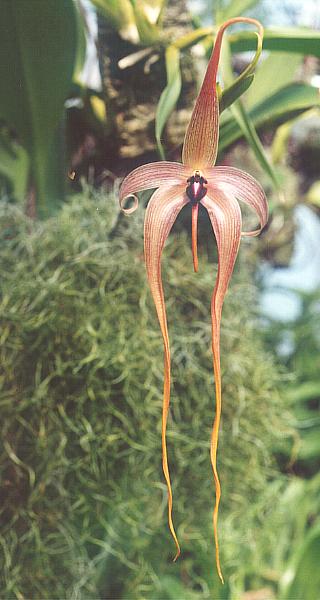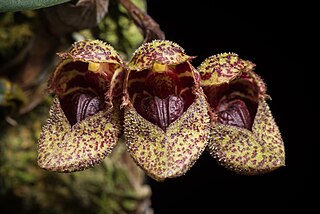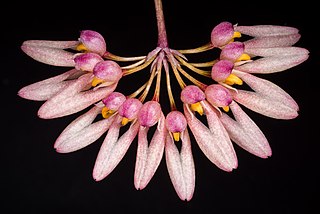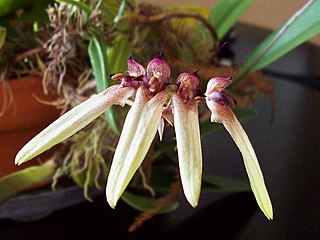
Orchids are plants that belong to the family Orchidaceae, a diverse and widespread group of flowering plants with blooms that are often colourful and fragrant. Orchids are cosmopolitan plants that are found in almost every habitat on Earth except glaciers. The world's richest diversity of orchid genera and species is found in the tropics.

Bulbophyllum is a genus of mostly epiphytic and lithophytic orchids in the family Orchidaceae. It is the largest genus in the orchid family and one of the largest genera of flowering plants with more than 2,000 species, exceeded in number only by Astragalus. These orchids are found in diverse habitats throughout most of the warmer parts of the world including Africa, southern Asia, Latin America, the West Indies, and various islands in the Indian and Pacific Oceans. Orchids in this genus have thread-like or fibrous roots that creep over the surface of trees or rocks or hang from branches. The stem is divided into a rhizome and a pseudobulb, a feature that distinguished this genus from Dendrobium. There is usually only a single leaf at the top of the pseudobulb and from one to many flowers are arranged along an unbranched flowering stem that arises from the base of the pseudobulb. Several attempts have been made to separate Bulbophyllum into smaller genera, but most have not been accepted by the World Checklist of Selected Plant Families.

Johannes Jacobus Smith was a Dutch botanist who, between years 1905 to 1924, crossed the islands of the Dutch East Indies, collecting specimens of plants and describing and cataloguing the flora of these islands. The standard botanical author abbreviation J.J.Sm. is applied to plants described by J.J. Smith.

Phenanthrenoids are chemical compounds formed with a phenanthrene backbone. These compounds occur naturally in plants, although they can also be synthesized.

Bulbophyllum frostii, commonly known as Frost's bulbophyllum or Dutchman's shoes is a species of orchid, In the wild it grows as an epiphyte, inhabiting evergreen seasonal lowland rainforests in Vietnam and more rarely in Thailand, including the Malay peninsula. It was more recently reported growing in the Yunnan province of China during a series of botanical surveys between 2017 and 2020. This plant is usually found at elevations of around 1500m above sea level.
Bulbophyllum gymnopus is a species of orchid in the genus Bulbophyllum.
Bulbophyllum liparidioides is a species of orchid in the genus Bulbophyllum. These rare orchids are native to Madagascar.

Bulbophyllum moniliforme is a species of orchid in the genus Bulbophyllum. It is indigenous to the Assam region in eastern India.
Bulbophyllum rugosibulbum is a species of orchid in the genus Bulbophyllum. It is one of several orchids first discovered by the Northern Rhodesian forestry officer Wilfred D. Holmes.
Bulbophyllum weberi is a species of orchid in the genus Bulbophyllum.
Bulbophyllum nocturnum is a species of epiphytic orchid that grows in New Britain. It was described in 2011, and is the first species of orchid known to consistently flower during the night, and close its flowers during the day.

Dendrobieae is a tribe in the subfamily Epidendroideae, in the family Orchidaceae. The Dendrobieae are mostly tropical, epiphytic orchids which contain pseudobulbs.

Gymnopusin is a phenanthrenediol produced by the orchid Bulbophyllum gymnopus. It is also found in Bulbophyllum reptans and Maxillaria densa.

Confusarin is a phenanthrenoid found in the orchids Eria confusa and Bulbophyllum reptans. It can also be synthesized.
André Schuiteman is a Dutch botanist in the Royal Botanic Gardens, Kew in London, United Kingdom, where he is the Research Leader for Asia in Plant Identification and Naming. Schuitemania, a genus of orchid, was named in his honour.
Jaap J. Vermeulen is a Dutch botanist, specializing in the Orchidaceae genus Bulbophyllum.
An attractant is any chemical that attracts an organism, e.g. i) synthetic lures; ii) aggregation and sex pheromones ; and iii) synomone

Bulbophyllum ericssonii is a species of orchid in the genus Bulbophyllum that grows from Malesia to New Guinea.

Bulbophyllum fenestratum is a species of orchid that is endemic to Southeast Asia. It is a small epiphyte with a single erect, egg-shaped leaf with the lower end towards the base, and seven to fifteen flowers about 10 mm (0.4 in) long on a peduncle 80–120 mm (3.1–4.7 in) long, each flower on a pedicel about the same length.

Bulbophyllum sect. Cirrhopetalum is a section of the genus Bulbophyllum. The taxon name comes from Latin cirrus (fringe) and Greek petalon (petal), hence meaning fringed-petaled.











